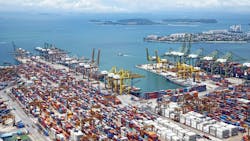Exporting Success in Uncertain Times
In simple terms, we are in uncertain times for exporters. Recent political uncertainty, such as Brexit and the US trade wars, are causing doubt and ambiguity in the market, especially for exporting manufacturers with long supply chains. Here, Robert Glass, Head of Marketing at leading composites manufacturer Exel Composites, explains the benefits of working with a company that can help insulate you through these challenges.
We’re in uncertain times. The US threatened to leave the Universal Postal Union (UPU), the United Kingdom continues to teeter on the edge of withdrawing from the single market and the yellow vest movement continues to block roads in France. These are only a few of the many politically unstable actions occurring around the globe. With all of these situations making headlines, and with further environmental and political inclemency set to begin, there is little hope of it ending anytime soon.
These global issues are making it harder for businesses, especially manufacturers and original equipment manufacturers (OEM), to forecast what is happening along trade routes, and how it will impact their operations. Changes in tariffs and political agreements also mean that previously promoted products could lose preferential status, which will increase costs and reduce the profits of producers.
Changes in tariffs are another potential outcome of the instability that could play havoc with exports. For example, if the UK is to leave the single market without a deal, World Trade Organisation (WTO) tariffs would come into effect, which would mean that there would be an attached cost for goods to enter the EU region. In the case of composites, WTO tariff codes such as 3923109010 would apply, adding a 6.5% duty onto the value of the exported goods.
Tariffs are also dependent on the point of origin of the goods in question. Products that are produced in a single country makes it simple to define their origin. However, with the increasingly global nature of manufacturing and production, this is rarely the case. Goods that are produced using materials or components from more than one country can affect the point of origin and subsequently the imposed tariffs.
Some countries must fulfill quotas on the number of parts making up an end product that is sourced internally or from other countries that have specific accords with them. In the EU these products are defined as having a preferential origin. This origin status confers, on the goods that have fulfilled certain criteria, specific tariff benefits that can facilitate goods movement within the EU.
Critically, because product supply chains are increasingly becoming more complex, not every business can afford to set up a just-in-time manufacturing system with all suppliers in one location. This is especially true when producers are looking to implement new materials or components that haven’t been used before, which demonstrates that having good routes are critical to innovation.
Global Production
Globalization means that no region is an island. Manufacturers in the UK exported 46% of all UK exports into Europe in 2018, and many manufacturers source components for products from further across the globe. With routes between countries becoming less predictable and impeded by tariffs, businesses are looking for methods of exporting that can protect or circumnavigate potentially difficult routes.
While businesses have a large arsenal of techniques, such as hedging, that can help protect orders to a certain extent, these techniques can’t circumnavigate tariffs and trade war challenges. Global producers, such as Exel Composites, have established production facilities across the globe, allowing for products to be manufactured and shipped from multiple geographical locations. This means that depending on where the order originates from, global producers are able to export the product to the client regardless of its location.
For example, in the case of a hard Brexit, it may be more difficult for UK producers to export to the European mainland. For example, looking at a possible post-Brexit scenario where UK products may be more expensive to export to mainland Europe (into the EU), Exel Composites would be able to shift production from its UK plant to one in the EU, isolating the Italian customer from the UK trade policies.
Production Chain
Having a chain of production facilities enables global producers to find alternative routes to export products to clients, all while maintaining the quality of the product that is developed from shared business knowledge. This can also allow products to maintain preferential status reducing the risk of origin-based tariffs.
This global process is also easier and more feasible than ever before due to increased access to automation and the ease of moving knowledge-based expertise thanks to modern technology. Global producers are able to ensure that the quality of products is maintained no matter where they are produced.
For this reason, global manufacturers and businesses looking to export should strive to have production facilities in a range of locations to ensure that they are able to insulate shipments from any ongoing uncertainty. This will also enable the manufacturers themselves to reduce costs and increase profit margins, as they will be able to export from a more reasonable geographic location without the fear of punitive tariffs.
OEM products and trade routes are under threat from rising political uncertainties. These instabilities are continuing to threaten the easy movements of goods and cutting into profits. Luckily, there are ways that manufacturers can use global suppliers to help protect themselves and their clients, regardless of what is happening in the world.
